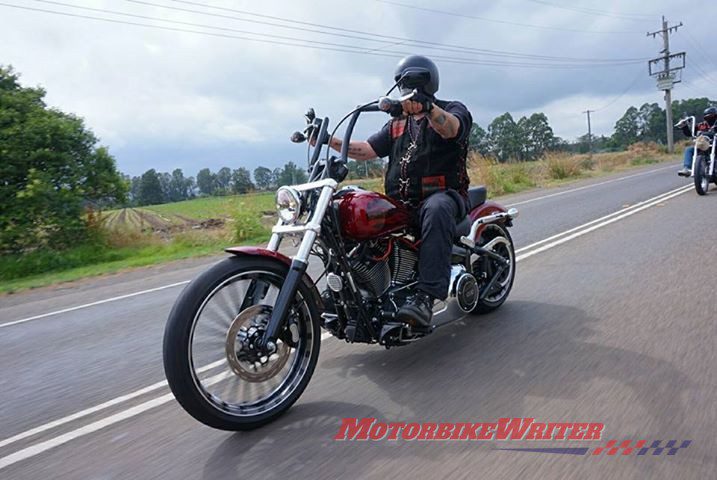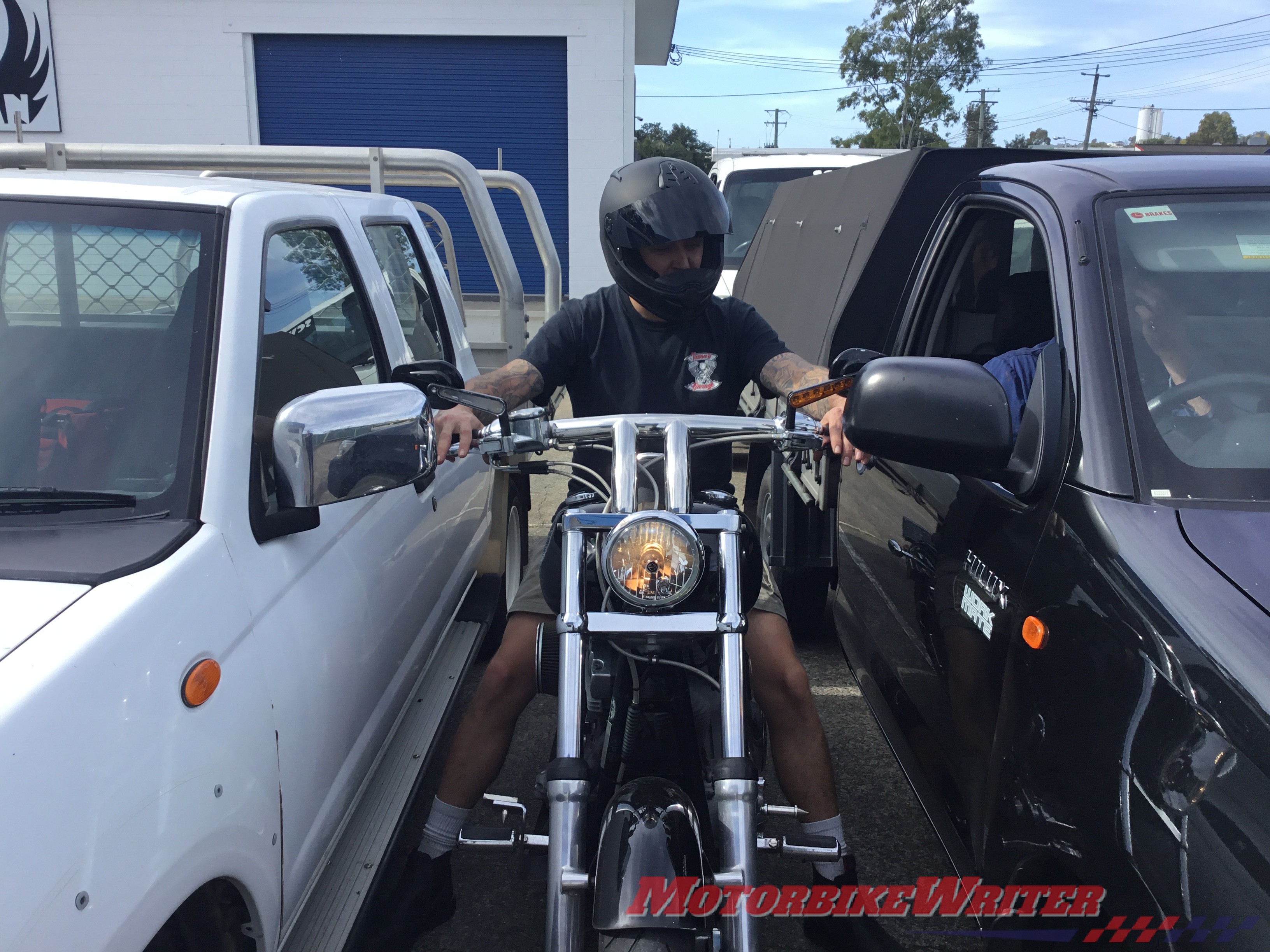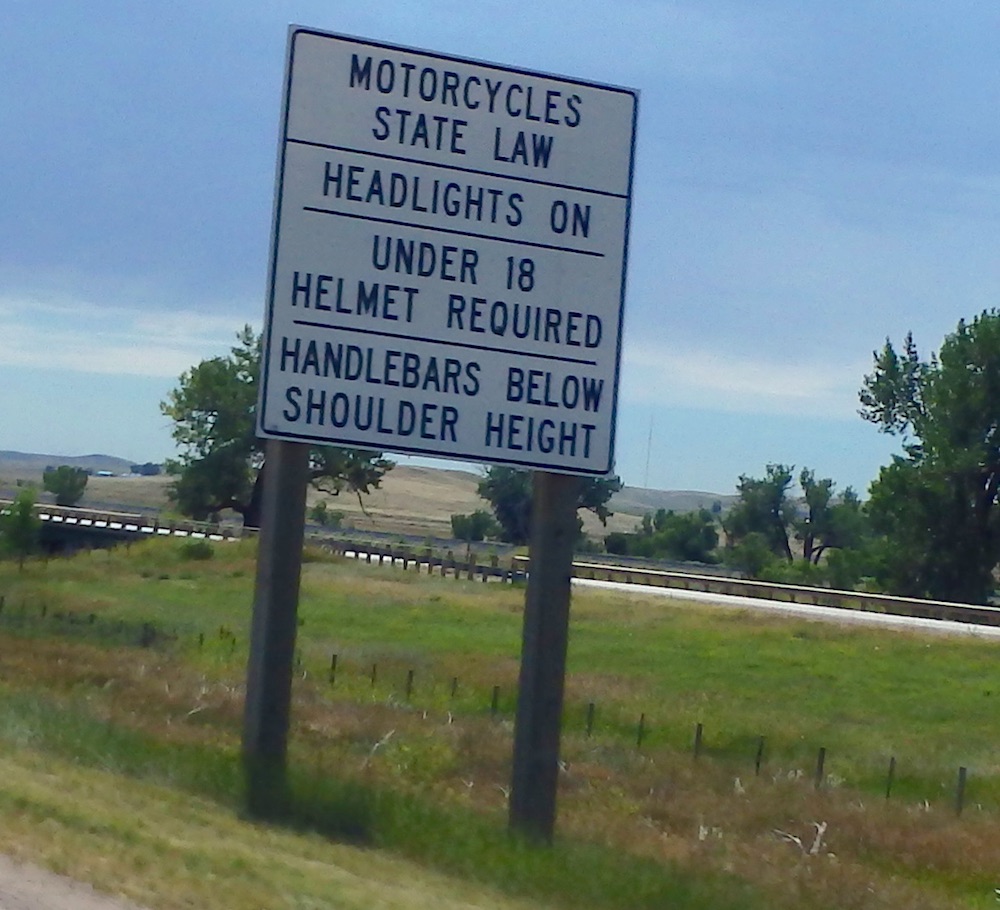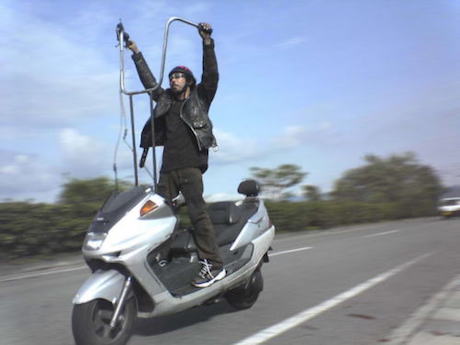An online petition calling for relaxed handlebar height rules for rider comfort and so lane filtering riders hit fewer car mirrors has been rejected by the Liberal Government, but met with “real concern” by the Federal Labor Opposition.
Gold Coast handlebar manufacturer Burleigh Bars Australia started the online Change.org petition to scrap the arbitrary limit of 380mm above the seat.
Click here if you would like to sign the petition.
Spokesman Zane Waldon says they would love to see no restrictions as in 31 states of the USA and 10 provinces and territories of Canada or even a shoulder height as in 10 USA states and British Columbia.
“Shoulder height would be ideal as it is based on the rider’s height and makes far more sense to me,” Zane says.
“But we are thinking it would be easier to get them to go back to the old rule (380mm above the attachment, not the seat) than to try and make a new rule.”
Handlebar height petition rejected
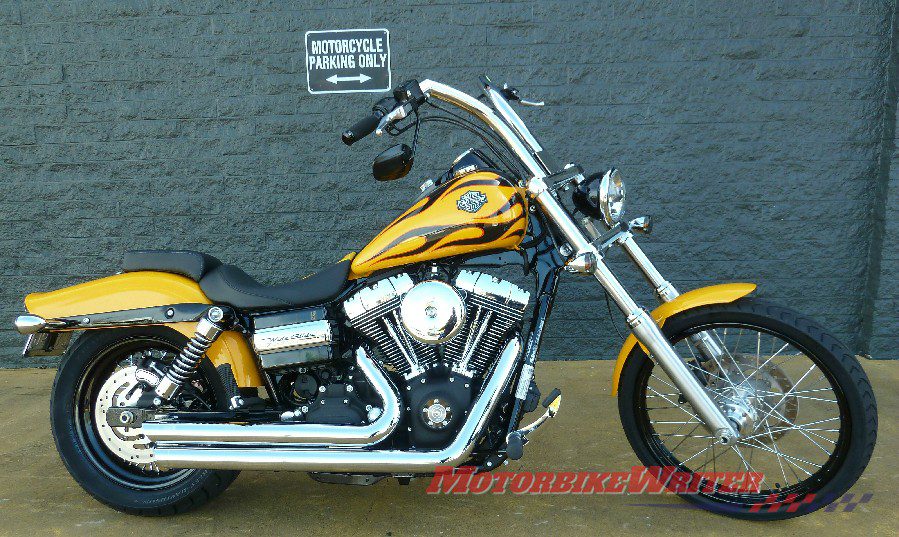
That may be wishful thinking as despite more than 6000 signatures, Urban Infrastructure and Cities Minister Paul Fletcher has rejected the petition.
A Ministerial spokesperson told us the Australian Design Rule requirement for motorcycle handlebar height is “not currently being reviewed”.
“After a considered review, the Australian Government and the state and territory governments decided to increase the maximum permitted motorcycle handlebar width by 200mm (to 1100mm) in 2015, because they each agreed this would save handlebar modification costs with no risk to safety. The allowable handlebar height was not raised for consideration at this time,” he says.
Zane says Harley-Davidson, Victory and Indian lobbied for the width change because they build motorcycles with standard bars wider than the previous minimum.
“For some reason they have changed the width but are reluctant to change the height ruling,” he says.
“We think these laws are unsafe. While we are allowed to lane split, the legal height puts us in line with most family car mirrors.”
Real concern
Long-time motorcycle supporter and Shadow Infrastructure and Transport Minister Anthony Albanese was not aware of the issue until we raised it with him but his office says he believes it is an “important issue”.
“This is an issue of real concern and I will be seeking a briefing from the Government,” he says.
“Motorcycles reduce traffic congestion and it’s important that the rules and regulations don’t make it harder for riders to move through traffic.
“Common sense tells you that Governments need to listen to safety experts, but also riders who know what is comfortable for them in controlling their bikes.”
Witch-hunt
Meanwhile, Zane says police are using the height restriction to conduct a witch hunt of riders.
Click here for examples of riders pulled over for “illegal” handlebars.
“In our eyes these laws are unjust and aimed at the cruiser community in a blatant witch-hunt for outlaws.”
Zane says they have seen an increase in riders replacing high bars due to fines and a drop in sales of their high bars due to the crackdown.
“Queensland and NSW seem to have been hit the worst at this stage with police harassing riders in the name of safety.”
According to the current Australian Design Rules, Motor Vehicles Standards Act 1989 and the National Code of Practice for Vehicle Construction, it is illegal to modify motorcycle handlebar height to any greater than 380mm from the lowest part of the handlebar grip to the lowest point of the seat.
“This effectively outlaws any set of bars taller than eight inches,” Zane says.
“The Government’s refusal to respond to the demands of the people potentially leaves thousands of Australian riders to pay unnecessary fines and worse still with void insurance policies over their bikes,” the petition says.
The ADR also makes it difficult for police to accurately measure handlebar heights as the point between the grip and the lowest point of the seat is offset.
This requires the police to use a combination of a tape measure and their line of sight to guesstimate the distance.
Fines vary between states but are typically three demerit points and up to a $360 fine.
Handlebar rules around the world
Many countries don’t have an issue with handlebar heights and have no rules governing them.
For example, in New Zealand the only stipulation is that a bike has “safe steering”.
However, in countries such as Australia, USA and Canada where cruiser-style motorcycles are popular, there is a wide variety of rules.
Interestingly, the USA is moving away from arbitrary measurements to a more sensible approach where the bars can’t be above the shoulders of the rider (10) or no restrictions at all (31).
Handlebar height laws seem to have been crafted on three grounds: they impair steering, they are a dangerous obstacle in a crash and they cause rider fatigue.
We could not find any scientific evidence to support any of these claims.
Anecdotal evidence varies with some saying it is easier to steer when your hands are closer to your eyes as it improves hand-eye co-ordination.
As for being a danger in a crash, any handlebar is an obstacle but there is no statistical correlation between injuries and type of handlebar.
As for fatigue, each rider has a different physiology, so it is impossible to prove that certain bars promote fatigue.
However, having your hands above your heart does reduce blood flow to the fingers.
If a rider occasionally releases one bar at a time to resume blood flow, that is entirely legal.
More realistically, handlebar measurements should have some relationship to the size of the rider, rather than some arbitrary measurements.
High-set ape-hanger bars were banned in 30 American states in the 1960s on the pretext of safety.
However, it was more likely introduced so police had reason to pull over and search riders believed to be members of outlaw motorcycle gangs.
Remember, this was during the height of media hype and public fear about bikies/bikers after the 1966 release of Hunter S. Thompson’s book, Hell’s Angels, and the 1969 cult film Easy Rider.
According to the American Automobile Association, the following laws currently apply in the various states and territories of the USA and Canada.
- Maximum of 15” above the seat: Alabama, Georgia, Manitoba, Maryland, Michigan, Ohio, Rhode Island, Vermont, Virginia, West Virginia.
- Handgrips below shoulder: Arizona, British Columbia, Florida, Illinois, Indiana, Louisiana, Maine, Nevada, New York, Utah, Wyoming.
- Maximum of 15 inches above handball fastening point: Washington.
- Maximum of 12 inches above handball fastening point: Nova Scotia.
- Handlebars not higher than eye level: Oklahoma.
- Handlebar grips no more than 6” above shoulder: Nevada.
- No restrictions: Alaska, Alberta, Arkansas, California, Colorado, Connecticut, Delaware, District of Columbia, Hawaii, Idaho, Iowa, Kansas, Kentucky, Massachusetts, Minnesota, Mississippi, Missouri, Montana, Nebraska, New Brunswick, New Hampshire, Newfoundland, New Jersey, New Mexico, North Carolina, North Dakota, Northwest Territories, Nunavit, Ontario, Oregon, Pennsylvania, Prince Edward Island, Puerto Rico, Quebec, Saskatchewan, South Carolina, South Dakota, Tennessee, Texas, Wisconsin, Yukon.


